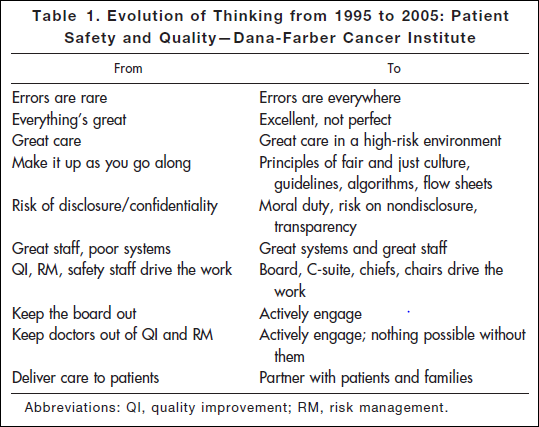January 21st, 2011 by DavedeBronkart in Health Tips, Opinion
No Comments »

There are several stages in becoming an empowered, engaged, activated patient — a capable, responsible partner in getting good care for yourself, your family, whoever you’re caring for. One ingredient is to know what to expect, so you can tell when things seem right and when they don’t.
Researching a project today, I came across an article* published in 2006: “Key Learning from the Dana-Farber Cancer Institute’s 10-Year Patient Safety Journey.” This table shows the attitude you’ll find in an organization that has realized the challenges of medicine and is dealing with them realistically:

“Errors are everywhere.” “Great care in a high-risk environment.” What kind of attitude is that? It’s accurate.
This work began after the death of Boston Globe health columnist Betsy Lehman. Long-time Bostonians will recall that she was killed in 1994 by an accidental overdose of chemo at Dana-Farber. It shocked us to realize that a savvy patient like her, in one of the best places in the world, could be killed by such an accident. But she was.
Five years later the Institute of Medicine’s report “To Err is Human” documented that such errors are in fact common — 44,000 to 98,000 a year. It hasn’t gotten better: Last November the U.S. Inspector General released new findings that 15,000 Medicare patients are killed in U.S. hospitals every month. That’s one every three minutes. Read more »
*This blog post was originally published at e-Patients.net*
January 20th, 2011 by RyanDuBosar in Health Policy, Research
No Comments »

While public opposition to healthcare reform has diminished since its passage, physician opinions are still negative, especially among specialists who see their value to the healthcare system decreasing as reform emphasizes primary care.
A survey reports that 65 percent of nearly 3,000 physicians in all specialties said the quality of healthcare in the country will deteriorate in the next five years. Seventeen percent of respondents believe the quality of healthcare will stay the same and 18 percent believe it will improve. Meanwhile, 30 percent of healthcare consumers believe that the quality of healthcare will improve.
Physicians cited as reasons for their pessimism personal political beliefs, anger at insurance companies and a lack of accurate planning in the reform act. Other reasons include that primary care physicians won’t have the time to keep up with the extra workload, forcing more patients to depend upon nurse practitioners for primary care. When asked who will likely handle the 32 million Americans expected to receive healthcare following passage of the reform, 44 percent said primary care physicians will handle the load and 44 percent said that nurse practitioners will see them. (Physicians could vote for more than one category; options include physicians assistants and specialists, for example.) Read more »
*This blog post was originally published at ACP Internist*
January 19th, 2011 by StevenWilkinsMPH in Better Health Network, Health Tips
2 Comments »

We’ve all been there. It often starts with some kind of recurring pain or dull ache. We don’t know what’s causing the pain or ache. During the light of day we tell ourselves that it’s nothing. But at 3:00am when the pain wakes you, worry sets in: “Maybe I have cancer or heart disease or some other life-ending ailment.” The next day you make an appointment to see your doctor.
So now you’re sitting in the exam room explaining this scenario to your doctor. Based on your previous experience, what’s the first thing your doctor would do?
A. Order a battery of tests and schedule a follow-up appointment.
B. Put you in a patient gown and conduct a thorough physical examination, including asking you detailed questions about your complaint before ordering any tests.
If you answered “A,” you have a lot of company. A recent post by Robert Centor, M.D., reminded me of yet another disturbing trend in the doctor-patient interaction. The post, entitled “Many doctors order tests rather than do a history and physical,” talks about how physicians today rely more on technology for diagnosing patients than their own “hands-on” diagnostic skills — a good patient history and physical exam, for example.
Prior to the technology revolution in medicine over the last 20 years, physician training taught doctors how to diagnose patients using with a comprehensive history and physical exam. More physicians today are practicing “test-centered medicine rather than patient-centered medicine.” Medical schools focus on teaching doctors to “click as many buttons on the computer order set as we possibly can in order to cover every life-threatening diagnosis.” The problem is that medicine is still an imperfect science, and technology is not a good substitute for an experienced, hands-on diagnostician. Read more »
*This blog post was originally published at Mind The Gap*
January 18th, 2011 by Michael Kirsch, M.D. in Better Health Network, Opinion
No Comments »

 Whistleblower readers know of my criticisms of the electronic medical record (EMR) juggernaut that is oozing over the medical landscape. Ultimately, this technology will make medical care better and easier to practice. All systems will be integrated, so that a physician will have instant access to his patients’ medical data from other physicians’ offices, emergency rooms and hospitals.
Whistleblower readers know of my criticisms of the electronic medical record (EMR) juggernaut that is oozing over the medical landscape. Ultimately, this technology will make medical care better and easier to practice. All systems will be integrated, so that a physician will have instant access to his patients’ medical data from other physicians’ offices, emergency rooms and hospitals.
In addition, data input in the physician’s office will use reliable voice activated technology, so that some antiquated physician behaviors, such as eye contact, can still occur. Clearly, EMR is in transition. I place it on the 40 yard line, a long way from a touch down or field goal position.
A colleague related a distressing meeting he had at the community hospital he works at. This hospital, like nearly every hospital in Cleveland, is owned by one of the two towering medical behemoths. I’m not a businessman, but I have learned that when something owns you, it’s generally better for the owner than the ownee. This meeting was about the hospital’s upcoming EMR policy. Sometimes, these hospital meetings are ostensibly to seek physician input, but the true purpose is to inform the medical staff about decisions that have already been made.
In the coming months, this hospital will adopt a computerized ordering system for all patients. In theory, this would be a welcome advance. It would create a digital and permanent record of all physician orders that could be accessed by all medical personnel involved in the patients’ care. It would solve the perennial problem of inscrutable physician handwriting, including mine. Read more »
*This blog post was originally published at MD Whistleblower*
January 16th, 2011 by Bryan Vartabedian, M.D. in Better Health Network, Opinion
No Comments »

I used to think they didn’t, but they do.
Clinical judgment is the application of individual experience to the variables of a patient’s medical presentation. It’s the hard-worn skill of knowing what to do and how far to go in a particular situation. It’s having the confidence to do nothing. Clinical judgment is learned from seeing lots of sick people. Good clinical judgment is when the gifted capacity of reasoning intersects with experience. Some doctors have better judgment than others.
Aristotle called this phronesis — or practical judgment.
Patients have practical judgment. We often can tell when something’s amiss with our own body. Things feel different or look different. Taking action on these observations is how we exercise judgment as patients.
Parents of children with central venous lines, for example, can often identify the early signs of infection before fever has ever appeared. They know the subtleties of their child’s behavior. The same goes for children with epilepsy. People with diabetes increasingly have the latitude to apply judgment to the management of their disease. This tends to be quite defined, however, with fixed variables and limited options for intervention. Read more »
*This blog post was originally published at 33 Charts*



















